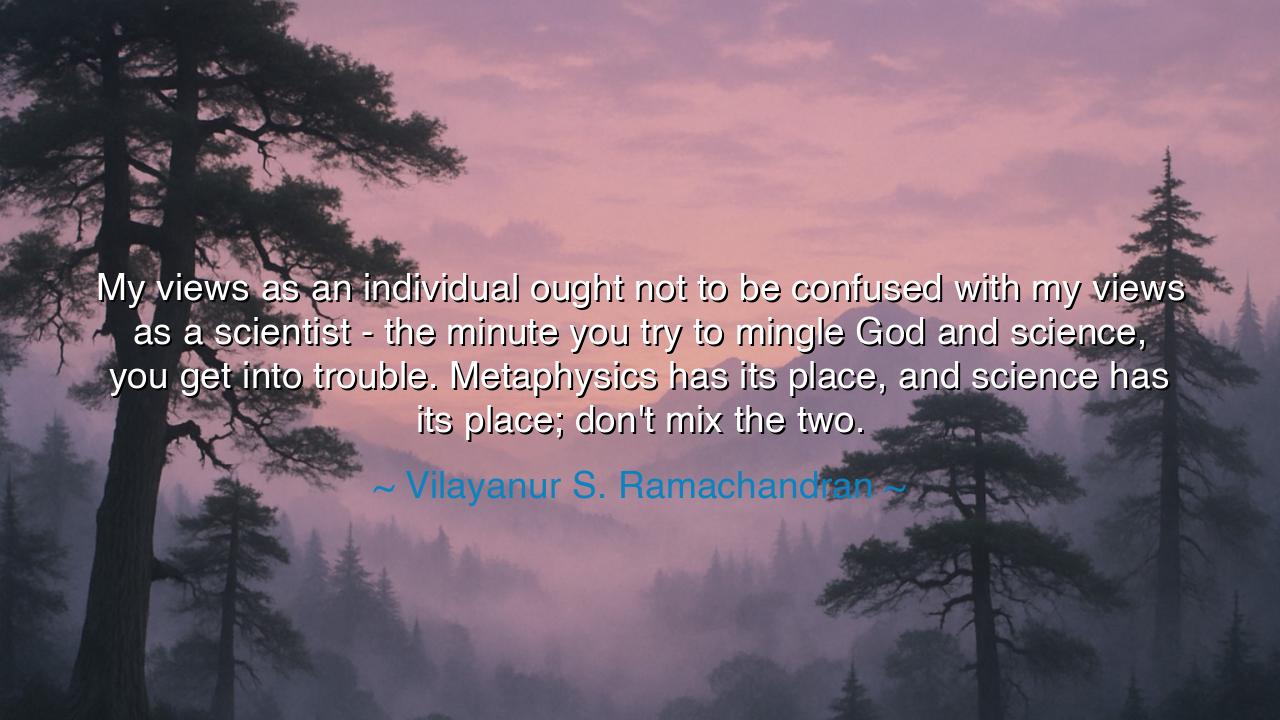
My views as an individual ought not to be confused with my views
My views as an individual ought not to be confused with my views as a scientist - the minute you try to mingle God and science, you get into trouble. Metaphysics has its place, and science has its place; don't mix the two.






In the realm of human understanding, where the forces of nature and the mysteries of existence converge, there has always been a tension between two powerful forces: science and faith. The great thinker, Vilayanur S. Ramachandran, with wisdom and clarity, speaks to this very tension when he declares, "My views as an individual ought not to be confused with my views as a scientist - the minute you try to mingle God and science, you get into trouble. Metaphysics has its place, and science has its place; don’t mix the two." In these words, Ramachandran draws a line—not to separate these two pursuits entirely, but to acknowledge that each serves its own purpose in the journey of understanding the world and our place within it. The lesson here is profound: we must recognize the boundaries of both reason and belief, respecting each for its unique contribution to human knowledge.
The ancients, too, struggled with this duality—the divine and the rational. The Greeks, for instance, revered the gods, seeing the heavens as the domain of divine power and the natural world as governed by eternal, immutable laws. Plato believed that the realm of ideas was separate from the physical world, suggesting that metaphysical truths could not be fully understood through physical observation alone. Similarly, the Stoics like Epictetus taught that the divine and the natural world had their places, but they must not be confused. The universe, in their view, was a harmonious system where both reason and divine will played their parts, yet never interfering with one another. Ramachandran’s words echo this ancient wisdom, acknowledging that the spiritual and the scientific realms should be kept distinct, each fulfilling its purpose without overstepping into the other’s territory.
However, throughout history, many have sought to blend the two—science and faith—in an attempt to answer the great mysteries of existence. Consider the works of Isaac Newton, whose groundbreaking laws of physics transformed our understanding of the natural world. Newton was a man of deep faith, yet he never allowed his religious views to obscure the scientific rigor that drove his discoveries. He saw the world as a reflection of divine order, but he never allowed metaphysical beliefs to interfere with his exploration of the physical universe. Ramachandran’s cautionary words remind us that while faith and science can coexist, we must not allow one to overshadow or distort the other. When we try to merge these realms, we risk losing the clarity and precision that science demands, while potentially diminishing the mystery and reverence that faith provides.
In the modern world, where the advances of science have allowed us to unlock the secrets of the brain, the cosmos, and the very fabric of existence, the challenge remains. Just as Galileo’s conflict with the Church highlighted the struggle between reason and belief, so too does our contemporary world wrestle with the intersection of science and faith. The discovery of the human genome, the understanding of quantum physics, and the study of neurobiology all present us with truths that often stand in contrast to religious narratives of creation and existence. Ramachandran’s words speak to this reality—reminding us that while we may seek a deeper meaning behind the natural world, we must not distort the findings of science in the name of belief. Each must have its own space to thrive and evolve.
Consider the ancient story of Socrates, who, despite the great wisdom he imparted to the people of Athens, was condemned to death for his philosophical pursuits—chiefly for questioning the gods and seeking knowledge beyond what was traditional. Socrates did not dismiss the divine, but he insisted that human reason must be the guide to understanding the world. His refusal to blindly follow religious dogma in favor of seeking the truth through reason serves as a lesson in the balance Ramachandran speaks of. Science and faith, Socrates taught, could coexist but must be placed in their rightful roles—each fulfilling its purpose, without the other claiming dominance.
The lesson here is one of respect—for both the scientific method and spiritual belief. While science seeks to explain the natural world with evidence, metaphysics explores the mysteries of existence and the divine, each providing insight into the human experience in its own unique way. Ramachandran’s call to keep these realms distinct is not a call to separate them completely, but to recognize that their interactions must be approached with caution. The heart of this wisdom is clear: science is a tool for understanding the world in its physicality, while faith provides a framework for understanding our place within the larger cosmic order.
As we navigate the complexities of our own lives and the world around us, let us remember Ramachandran’s wise counsel. Just as the ancients sought to balance reason and faith, we too must respect the integrity of each pursuit, understanding that both contribute to the whole of our existence. Science must remain grounded in the pursuit of truth, while faith must allow for the mystery and wonder of the divine. In doing so, we may live with greater clarity, purpose, and understanding, recognizing that both reason and belief play vital roles in our search for knowledge and meaning in the vast expanse of existence.






AAdministratorAdministrator
Welcome, honored guests. Please leave a comment, we will respond soon